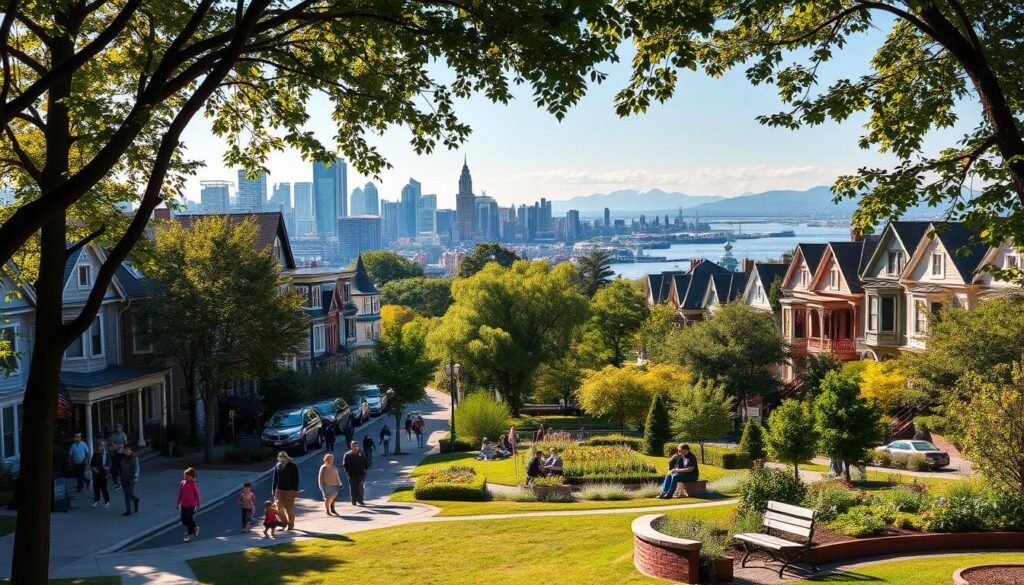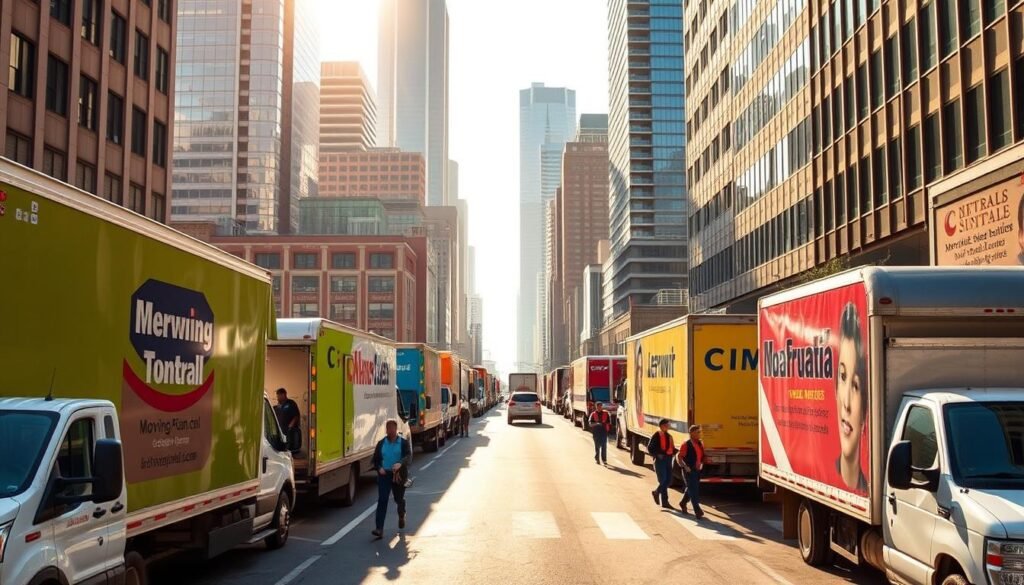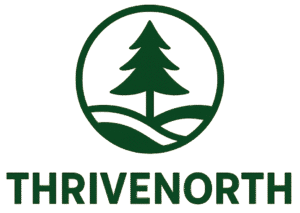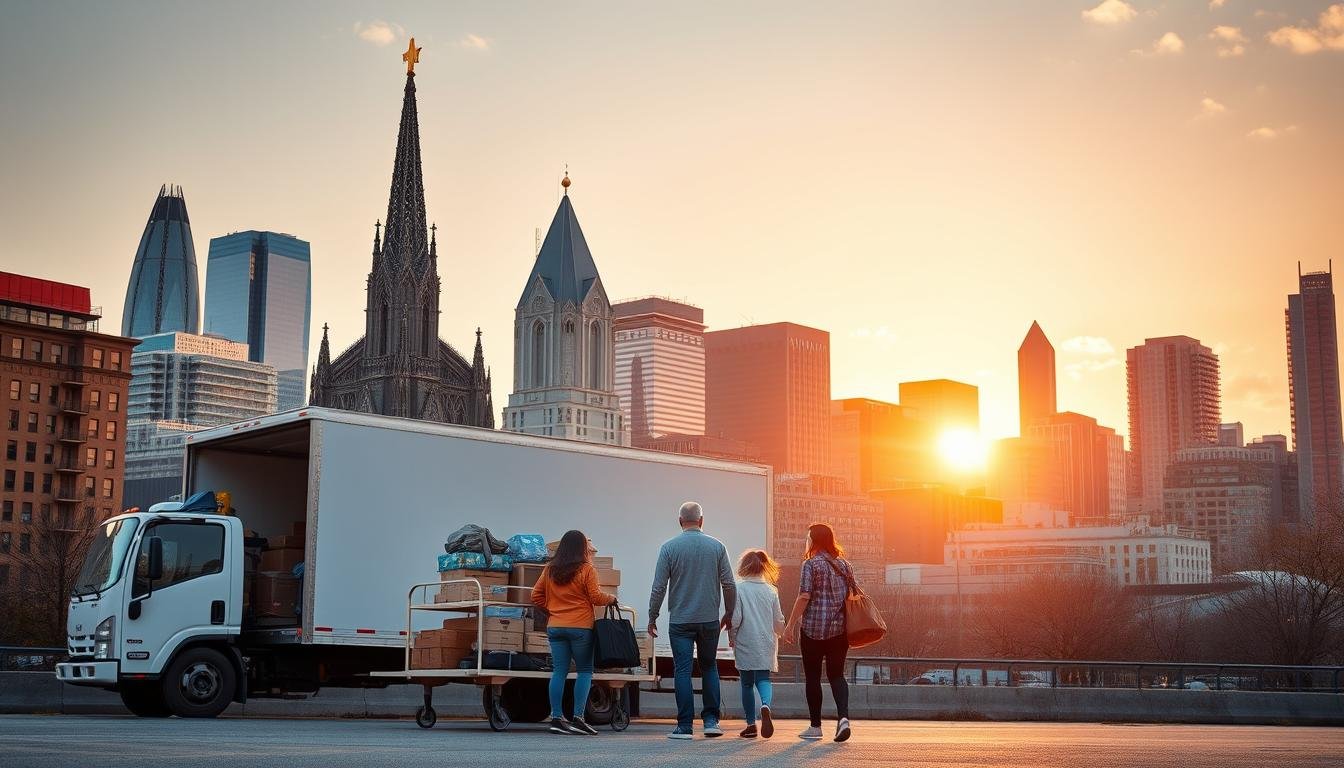Montreal is a city where North American and European cultures meet. It’s becoming a favorite spot for expats and newcomers. With its rich history, lively culture, and welcoming community, many are making it their home.
Starting fresh in a new city can feel scary. But with the right help, it can be easier. This guide is here to assist you in preparing for your move to Montreal. It covers everything from cultural tips to practical advice on settling in.
Key Takeaways
- Understanding Montreal’s unique cultural landscape
- Essential steps for a smooth relocation
- Practical advice on finding accommodation
- Insights into Montreal’s vibrant cultural scene
- Tips for integrating into the local community
Why Choose Montreal?
Montreal is a city that offers a unique blend of culture, economic opportunity, and quality of life. It’s an attractive destination for newcomers. The city balances tradition with modernity, creating a vibrant and diverse environment.
Cultural Richness and Diversity
Montreal is known for its cultural richness and diversity. It has many festivals, museums, and cultural events. Neighborhoods like Plateau Mont-Royal and Mile End are full of cultures, cuisine, and street art.
Economic Opportunities
Montreal has a thriving economy with strong industries like technology, aerospace, and pharmaceuticals. It’s home to many startups and established companies, providing job opportunities. Montreal is also business-friendly and has lower operational costs than other major North American cities.
| Industry | Major Companies | Growth Prospects |
|---|---|---|
| Technology | Google, Microsoft, IBM | High |
| Aerospace | Bombardier, Bell Textron | Moderate |
| Pharmaceuticals | Merck, Pfizer | High |
Quality of Life
Montreal offers an exceptional quality of life. It has urban amenities and natural beauty. The city has parks, green spaces, and outdoor activities, along with a good public transportation system.
Montreal’s education system is highly regarded. It has top-ranked universities and colleges. The city’s healthcare system is also well-developed, providing high-quality medical services.
Montreal’s diverse culinary scene, vibrant nightlife, and cultural events make life exciting and fulfilling.
Things to Know Before Moving to Montreal
Before moving to Montreal, it’s key to know about the city’s culture and environment. This knowledge helps newcomers adjust quickly and enjoy their time in this lively city.
Language Considerations
Language is important in Montreal, with French being the main language. But, the city also values bilingualism.
French Language Requirements
Many people in Montreal speak English, but knowing French is beneficial. It’s not just for talking; it opens up cultural and social doors. For example, many jobs require or prefer bilingual candidates.
Bilingualism in Daily Life
Bilingualism is useful in Montreal. You’ll see both French and English in public services, businesses, and events. Knowing both languages makes everyday tasks easier, from shopping to using healthcare services.
Weather and Climate
Montreal’s weather is cold in winter and warm in summer. It’s important to understand these changes.
Winters are cold with lots of snow and freezing temperatures. Summers are warm and humid, perfect for outdoor fun. Knowing the weather helps you dress right and plan activities for each season.
Cultural Nuances
Montreal’s culture is a mix of French and Canadian traditions. The city is famous for its arts, festivals, and food. Newcomers should dive into these cultural aspects to fit in.
Montrealers love their cultural events, like the Just for Laughs festival and Osheaga music festival. Joining these events is a great way to meet people and experience the city’s culture.
Legal Requirements for Moving to Montreal
Understanding the legal steps for moving to Montreal is key. It ensures a smooth transition. Newcomers must follow these steps to become residents and fit into Canadian society.
Immigration Requirements
Immigration rules are a big part of moving to Montreal. These rules change based on if you’re a Canadian or an international resident.
For Canadian Citizens
Canadian citizens moving to Montreal don’t need extra immigration steps. But, they must update their records and get provincial health insurance.
For International Residents
International residents face a different path. They must apply for a visa or permanent residency. This involves several steps:
- Checking if you meet age, education, and work experience criteria.
- Applying through the Express Entry system.
- Getting an Invitation to Apply (ITA) for permanent residency.
Work Permits and Visas
Getting a work permit is essential for those moving to work in Montreal. The type of permit needed depends on your job and immigration status. Some permits are tied to a specific employer, while others are more flexible.
Healthcare Registration
Registering for healthcare is a must when moving to Montreal. Quebec’s healthcare system requires registration for all residents. You’ll need to apply for a Carte d’assurance maladie to access healthcare services.
To register, you’ll need to show proof of residency and identity. Start this process early to avoid healthcare coverage gaps.
Cost of Living in Montreal
Living in Montreal is more affordable than in other big Canadian cities. But, costs can change a lot based on your lifestyle and where you live. Knowing these costs is key to a smooth move.
Housing Costs
Housing costs are a big deal in Montreal. The city has many housing types, like apartments and single-family homes. Prices vary a lot, depending on the area.
Rental Prices by Neighborhood
Rental prices in Montreal vary a lot by neighborhood. For example, downtown areas are pricier than outer neighborhoods.
| Neighborhood | Average Rent (1 Bedroom) | Average Rent (3 Bedroom) |
|---|---|---|
| Downtown | $1,200 | $1,800 |
| Plateau Mont-Royal | $1,100 | $1,600 |
| Mile End | $1,000 | $1,500 |
Buying vs. Renting
Choosing to buy or rent depends on many things. This includes your financial situation, future plans, and what you prefer. Buying a home is a big investment. Renting gives you more flexibility.
Food and Utilities
Food and utility costs in Montreal are pretty good. Grocery prices can change based on what you eat and where you shop. Utility costs like electricity, heating, and water stay about the same.
Average monthly utility costs for a small apartment are around $100-$150.
Transportation Expenses
Montreal has a great public transportation system. It makes traveling without a car easy. A monthly public transit pass costs about $85.
Entertainment and Leisure
Montreal is full of culture with lots of free or cheap things to do. This includes museums, parks, and festivals. The cost for fun can be $50 to $100 a month, depending on what you like.
Montreal Neighborhoods Guide
Exploring Montreal’s neighborhoods is like discovering different worlds within one city. Each neighborhood has its own unique character, advantages, and attractions. This makes Montreal a diverse and exciting place to live.
Downtown/Centre-Ville
Downtown Montreal, or Centre-Ville, is the heart of the city’s commercial and cultural activities. It is known for its vibrant atmosphere, historic landmarks like the Old Port, and modern amenities. Residents enjoy easy access to public transportation, shopping centers, and entertainment venues.
Plateau Mont-Royal
The Plateau Mont-Royal neighborhood is renowned for its artistic vibe, trendy boutiques, and multicultural cuisine. This eclectic area attracts young professionals and families alike. It offers a unique blend of urban living and cultural experiences.
Mile End
Mile End is a charming neighborhood known for its Hasidic community, historic buildings, and emerging food scene. It offers a more laid-back atmosphere compared to other parts of the city. There’s a strong sense of community here.
Griffintown
Griffintown is a rapidly evolving neighborhood that has transformed from an industrial area to a hub for young professionals and families. It offers modern housing, trendy restaurants, and a lively atmosphere.
Other Notable Areas
Montreal has many other neighborhoods worth exploring, each with its unique charm.
Westmount
Westmount is an affluent neighborhood known for its beautiful parks, historic homes, and prestigious schools.
Outremont
Outremont is a residential neighborhood with a mix of historic and modern homes. It’s known for its quiet atmosphere and community amenities.
Verdun
Verdun is a family-friendly neighborhood with a suburban feel. It offers parks, recreational facilities, and a strong sense of community.
Saint-Henri
Saint-Henri is a historic neighborhood that has undergone significant revitalization. Now, it offers a mix of old and new, with trendy cafes and boutiques.
| Neighborhood | Characteristics | Best For |
|---|---|---|
| Downtown/Centre-Ville | Vibrant, commercial, cultural | Young professionals, tourists |
| Plateau Mont-Royal | Artistic, trendy, multicultural | Artists, young families |
| Mile End | Laid-back, historic, food scene | Families, foodies |
| Griffintown | Modern, lively, professional | Young professionals, families |
Best Places to Live in Montreal
Montreal has many neighborhoods, each with its own vibe. Whether you’re a family, a young professional, a student, or a retiree, there’s a place for you. Each area offers something special, making Montreal a great place to live.
For Families
Families want safe, community-focused areas with good schools and parks. Beaconsfield and Dollar-des-Hermites are top choices. They offer a suburban life with easy access to city amenities.

For Young Professionals
Young professionals seek lively areas with good public transport and work proximity. Plateau Mont-Royal and Mile End are perfect. They boast vibrant nightlife, diverse food, and easy downtown access.
For Students
Students need areas close to universities and affordable housing. Le Plateau Mont-Royal and Rosemont-Petite-Patrie are ideal. They offer proximity to schools and a lively cultural scene.
For Retirees
Retirees prefer quiet, safe spots with healthcare and community services. Hampstead and Côte-des-Neiges are great. They provide a peaceful setting and amenities for seniors.
Knowing Montreal’s neighborhoods helps newcomers find the best fit. Consider safety, amenities, and community when choosing where to live. This way, you can make a smart decision for your lifestyle in Montreal.
Finding Housing in Montreal
When moving to Montreal, finding a place to live is key. You need to know the city’s neighborhoods and rental options. It’s important to understand the rental market, work with real estate agents, and know your rights as a tenant.
Rental Market Overview
The rental market in Montreal is competitive, more so during peak seasons. The city’s moving day on July 1st can make finding housing tough. Be ready to act fast and explore different areas to find the right place.
Working with Real Estate Agents
Real estate agents can help a lot. They know the housing market well. They can guide you on neighborhoods, prices, and the application process.
Online Resources for Housing
There are many online tools for finding housing in Montreal. Sites like PadMapper and Centris.ca list many rentals. You can also use social media and local ads to find a place.
Understanding Lease Agreements
Before signing a lease, know what it says. Look at the lease term, rent, and who does what. It’s important for both you and your landlord.
July 1st Moving Day Phenomenon
Montreal’s July 1st moving day is big. Many leases end on June 30th, and new ones start on July 1st. This means lots of people looking for places to live.
Tenant Rights
Tenants in Montreal have rights under the Régie du logement. Knowing these rights, like about rent increases and eviction, helps a lot.
Being informed and working with professionals can help you find housing in Montreal. This knowledge is great for your montreal moving checklist. It makes moving easier and less stressful.
Moving to Montreal: Complete Guide to Transportation
When you move to Montreal, knowing how to get around is important. The city has many ways to travel, fitting different needs and likes.
Public Transit System
Montreal’s public transit is great and easy to use. It includes the metro and buses, making travel without a car simple.
Metro System
The Montreal metro is a good choice for city travel. It has four lines that cover a lot of the city. It’s reliable and runs often.
Bus Network
The bus network adds to the metro, reaching more places. It’s a good option when the metro isn’t running. The routes are well thought out for easy travel.
OPUS Card and Fares
The OPUS card is used for public transit fares. It’s easy to refill at many stations. It makes paying for transit simple.
Biking in Montreal
Biking is popular in Montreal. There are many bike lanes and places to rent bikes. It’s a green way to see the city.
Car Ownership Considerations
Having a car in Montreal can be handy. But, it means dealing with parking rules and winter driving.
Parking Regulations
Parking in Montreal has its own rules. You need to know about permits and time limits.
Winter Driving
Driving in Montreal’s winter needs extra care. Snow and ice are common. Knowing about winter tires and driving tips is important.
| Transportation Mode | Convenience | Cost | Environmental Impact |
|---|---|---|---|
| Public Transit | High | Moderate | Low |
| Biking | Moderate | Low | Low |
| Car Ownership | High | High | High |
Knowing about Montreal’s transport options helps a lot when moving. The right choice lets you enjoy everything Montreal has to offer.
Moving Companies in Montreal
Finding a good moving company in Montreal can make moving easier. There are many choices, so it’s key to know what each offers. This helps you choose wisely.
Top-Rated Local Movers
Montreal has many top local movers. They are known for being professional and quick. ABC Moving and Montreal Movers offer full services like packing and moving. They make sure your move is smooth.
International Moving Services
If you’re moving from another country, there are services for that too. These companies deal with the complex stuff like customs and long-distance moves. Royal Moving International offers special help for moving to Montreal from abroad.
DIY Moving Options
For those who want to save money or like to do things themselves, DIY moving is an option. You can rent a truck and move everything yourself.
Truck Rentals
Budget Truck Rental has trucks for all sizes of moves. They let you rent for as long as you need and give you the tools for a successful DIY move.
Storage Solutions
If you need to store things temporarily, Montreal has many options. Public Storage Montreal offers safe, climate-controlled spaces for your belongings.

Montreal Moving Checklist
When moving to Montreal, planning is key. A detailed moving checklist helps ensure a smooth transition. It’s important to plan ahead to manage all moving tasks efficiently.
3 Months Before Moving
Start by looking into Montreal neighborhoods to find the right one for you. Begin decluttering your home, deciding what to keep, donate, sell, or throw away. Let your current landlord or agent know you’re moving.
Look for places to live in Montreal. Check out rental listings and talk to real estate agents.
- Research neighborhoods
- Declutter your home
- Notify your landlord or real estate agent
- Explore housing options
1 Month Before Moving
Now, focus on finding a place to live in Montreal. Book a moving company or rent a vehicle if you’re doing it yourself. Start packing items you don’t use often. If needed, arrange for storage.
Update your address with the post office, banks, and other important places.
- Secure housing in Montreal
- Book a moving company or rent a moving vehicle
- Pack non-essential items
- Arrange for storage if needed
Moving Week
Make sure your moving details are confirmed. Pack a box with important documents, medications, and a change of clothes. Set up utilities at your new home.
Finish any remaining tasks, like cleaning your old home or switching home services.
- Confirm moving details
- Pack an essentials box
- Set up utilities at your new address
- Complete last-minute tasks
After Arrival
Check your new home for damage and take photos. Update your address with the SAAQ and Hydro-Québec. Get to know local services and amenities.
- Inspect your new home
- Update your address
- Familiarize yourself with local amenities
Setting Up Your Life in Montreal
Starting your life in Montreal requires several important steps. You’ll need to handle banking, finances, and learn about the local schools. It’s a lot to think about.
Banking and Finances
First, you’ll need to open a bank account. This makes it easy to manage your money every day.
Opening a Bank Account
To open a bank account, you’ll need ID, proof of address, and sometimes income proof. Big banks in Montreal are Royal Bank of Canada, TD Canada Trust, and Bank of Montreal. Look around to find the best bank for you.
Understanding Quebec Taxes
Quebec has its own taxes, in addition to Canadian federal taxes. Knowing your tax duties is key. You might need to file both federal and provincial taxes. Check out the Revenu Québec website for more on provincial taxes.
Utilities and Services
Setting up your utilities and services is also key. You’ll need to arrange for internet, phone, electricity, and gas.
Internet and Phone
Big names in Montreal for these services are Bell Canada and Rogers Communications. Look at their plans to see what works best for you.
Electricity and Gas
Hydro-Québec is the main electricity provider in Quebec. You can sign up with them for your electricity needs.
Schools and Education
If you’re moving with family, knowing about the schools is important. Montreal has many schools, like public, private, and international ones.
| School Type | Language | Curriculum |
|---|---|---|
| Public | French | Quebec Curriculum |
| Private | English/French | Varied |
| International | English/French/Other | International Baccalaureate, etc. |
Healthcare Services
Montreal’s healthcare is free for everyone. You’ll need to sign up with the Régie de l’assurance maladie du Québec (RAMQ) for health insurance. Knowing what’s covered and how to get it is important for your health.
Montreal Moving Tips and Hacks
When moving to Montreal, it’s good to know some practical tips. Moving to a new city can be tough. But with the right advice, you can handle Montreal’s unique aspects easily.
Dealing with Winter Moves
Montreal’s winters are cold and snowy. To make your move easier, hire professional movers who know how to handle winter moves. Also, pack your belongings well to keep them safe from the cold and snow. Use sturdy, waterproof packing materials to keep your items dry and safe.
Language Navigation Tips
Many Montrealers speak English, but French is more common. To get around, learn basic French phrases and use language learning apps. Showing you try to speak French can help you fit in better.
Cultural Integration Strategies
Montreal has a lively cultural scene. To get into the local vibe, go to community events, visit museums, and explore different areas. Join groups that match your interests to meet people and feel more at home.
Community Groups and Resources
Find groups that match your hobbies or interests. There are groups for outdoor activities, cultural events, and social gatherings. Websites like Meetup.com are great for finding groups that fit your lifestyle.
Local Events and Festivals
Montreal has many festivals and events all year, like the Just for Laughs festival and the Montreal Jazz Festival. Going to these events is a great way to experience the city’s culture and meet people.
| Event | Month | Description |
|---|---|---|
| Just for Laughs | July | A comedy festival featuring performances by comedians from around the world. |
| Montreal Jazz Festival | June/July | A celebration of jazz music with performances by local and international artists. |
| Osheaga Music Festival | August | A music festival featuring indie, rock, and electronic music. |
Conclusion
Deciding to move to Montreal is a big step. It needs careful planning and preparation. This guide helps you understand the city’s culture, economy, and lifestyle.
When moving, you’ll face challenges like language and weather. You’ll also need to find the right place to live. This guide offers tips to help you adapt and succeed in Montreal.
Starting a new life in Montreal is exciting. The city is full of culture, history, and modern life. By embracing the city’s spirit and community, your move will be rewarding. With the right mindset and planning, you can make the most of your time in Montreal.
FAQ
What are the essential things to know before moving to Montreal?
Before moving to Montreal, learn about the city’s culture and language. Also, understand the cost of living and neighborhoods. Knowing the legal requirements can make your move easier.
How do I navigate the rental market in Montreal?
To find a rental in Montreal, work with good real estate agents. Use online resources and know your lease. Remember, July 1st is a big moving day.
What are the best neighborhoods to live in Montreal?
Montreal’s best neighborhoods vary by personal taste. Downtown, Plateau Mont-Royal, and Mile End are favorites. Visit these areas to find your perfect spot.
How do I get around Montreal without a car?
Montreal’s public transit is great for getting around without a car. The city also loves biking, with many lanes and rentals. These options are cheap and easy.
What are the costs associated with moving to Montreal?
Living in Montreal can cost a lot, depending on housing, food, and transport. Knowing these costs helps manage your budget. Housing is a big expense, so plan well.
How do I register for healthcare services in Montreal?
To get healthcare in Montreal, apply for a health card through RAMQ. You’ll need proof of address and other documents.
What are the best moving companies in Montreal?
Montreal has many top moving companies for local and international moves. Compare them to find the best for your needs and budget.
How can I integrate into Montreal’s culture?
Learn French, join local events, and meet people to fit in Montreal. Being open and respectful helps you connect and feel at home.
What are the key considerations for families moving to Montreal?
Families should look for safe, family-friendly neighborhoods with good schools. Understanding Montreal’s education system helps your family settle well.
How can I deal with the winter weather in Montreal?
Be ready for winter with warm clothes and snow gear. Stay updated on weather and enjoy winter sports like skiing. Embracing winter makes Montreal more fun.





